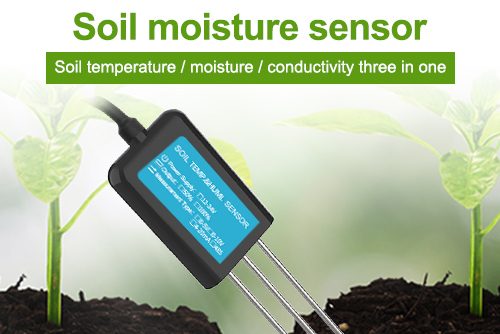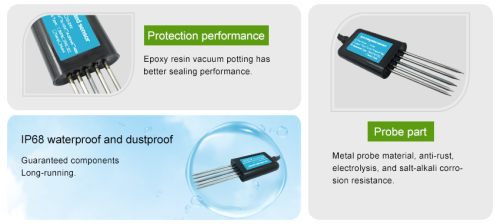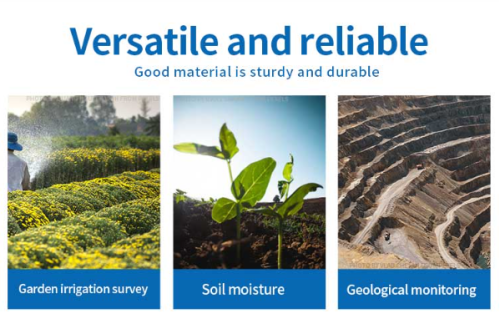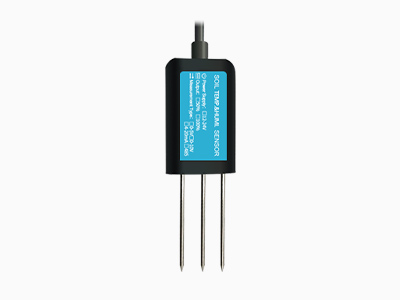In recent years, the agricultural industry has undergone a major transformation, driven by technological innovations aimed at optimizing agricultural practices. One such advance is the soil moisture probe, which has revolutionized agriculture by providing real-time data on soil moisture levels. These detectors provide valuable insights into soil health, enabling farmers to increase crop yields while conserving resources. This paper explores the transformative impact of soil moisture detectors on modern agriculture, with an in-depth study of their functions, benefits, and various applications.

Understanding Soil Moisture Probes
Soil moisture probes, also known as soil moisture sensors or soil moisture monitoring systems, are electronic devices designed to measure and monitor the moisture content of soil. These probes utilize advanced technologies to assess the volumetric water content in the soil, providing crucial information for irrigation management and crop health. By collecting and analyzing this data, farmers and agricultural professionals gain valuable insights into the soil’s moisture levels, enabling them to optimize irrigation strategies and conserve water resources.
Functionality and Operation

Soil moisture probes operate through a combination of physical and chemical mechanisms to capture essential soil moisture data. The most common type of soil moisture probe is the capacitance sensor, which measures the dielectric properties of the soil to determine moisture levels. This is typically achieved through the use of probes inserted into the ground, where they assess the soil’s ability to store an electric charge, which correlates with the soil’s moisture content. Additionally, advanced soil moisture probes may incorporate temperature and salinity sensors to provide comprehensive soil health assessments.
Benefits of Soil Moisture Probes
The integration of soil moisture probes offers a myriad of benefits that significantly impact agricultural productivity and sustainability:

- Precision Irrigation: Soil moisture probes enable precise irrigation management by providing real-time data on soil moisture levels. This allows farmers to optimize water usage, reduce water wastage, and prevent over-irrigation, thereby conserving water resources and minimizing operational costs.
- Enhanced Crop Health: By monitoring soil moisture levels, farmers can tailor their irrigation practices to match the specific needs of their crops. This targeted approach promotes healthier plant growth, improves water uptake, and reduces the risk of water stress, ultimately leading to improved crop yields and quality.
- Resource Efficiency: Soil moisture probes contribute to resource efficiency by facilitating data-driven decision-making. Farmers can adjust their irrigation schedules based on precise soil moisture data, leading to more efficient water utilization and reduced environmental impact.
- Environmental Conservation: The optimized use of water made possible by soil moisture probes helps minimize environmental degradation, such as water depletion and soil erosion, preserving ecosystems and natural habitats.
- Increased Yields: By maintaining optimal soil moisture conditions, farmers can enhance crop yields and quality, leading to improved profitability and food security.
Applications of Soil Moisture Probes
Soil moisture probe have diverse applications across various agricultural contexts, including:
- Large-Scale Farming: In extensive agricultural operations, soil moisture sensor are utilized to monitor and manage soil moisture levels across vast tracts of land, ensuring uniform and efficient irrigation practices.
- Precision Agriculture: Soil moisture sensor are integral to precision agriculture, enabling farmers to apply water with precision, tailored to the specific moisture needs of individual plants or sections of a field.
- Horticulture and Viticulture: Soil moisture meter play a crucial role in managing soil moisture levels in horticultural and viticultural settings, where precise irrigation is essential for optimal plant growth and fruit production.
- Research and Development: Soil moisture sensor are research and development initiatives to study soil dynamics, test new irrigation practices, and develop innovative farming technologies.
Challenges and Future Developments
While soil moisture probes have significantly advanced agricultural practices, several challenges and opportunities for improvement exist. Some of the key considerations for the future development of soil moisture sensor include:
Accuracy and Reliability: Continuous advancements in probe technology are essential to enhance the accuracy and reliability of soil moisture data, ensuring that farmers can make informed decisions based on trustworthy information.

Integration with Smart Farming Systems: The integration of soil moisture meter with broader smart farming systems, including data analytics, automation, and predictive modeling, holds immense potential for optimizing agricultural operations.
Affordability and Accessibility: Making soil moisture meter more affordable and accessible to small-scale farmers and agricultural communities in developing regions can democratize access to advanced farming technologies and improve global food security.
Environmental Monitoring: Beyond agricultural applications, soil moisture meter can contribute to environmental monitoring efforts, such as assessing soil moisture levels in degraded ecosystems and tracking the impact of climate change on soil conditions.
Conclusion
Soil moisture probes represent a transformative tool in modern agriculture, empowering farmers with real-time insights into soil moisture levels and enabling data-driven decision-making. By optimizing irrigation practices and conserving water resources, these probes contribute to sustainable farming practices, enhanced crop yields, and environmental conservation. As technology continues to evolve, the integration of soil moisture probes with smart farming systems holds promise for further revolutionizing agricultural practices and addressing global food security challenges. With ongoing innovation and adoption, soil moisture probes are poised to play a pivotal role in shaping the future of agriculture, ensuring efficient and sustainable food production for generations to come.
